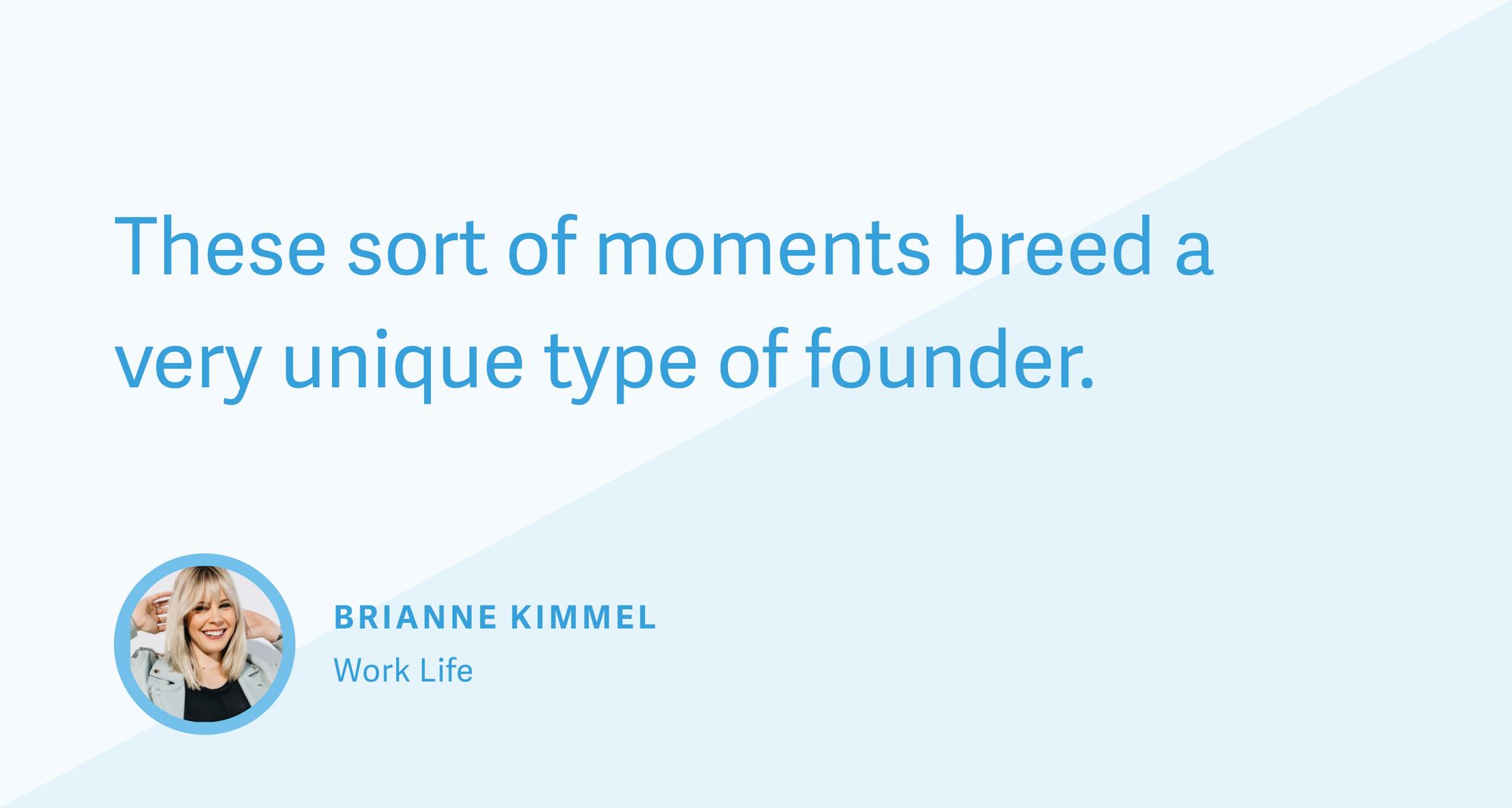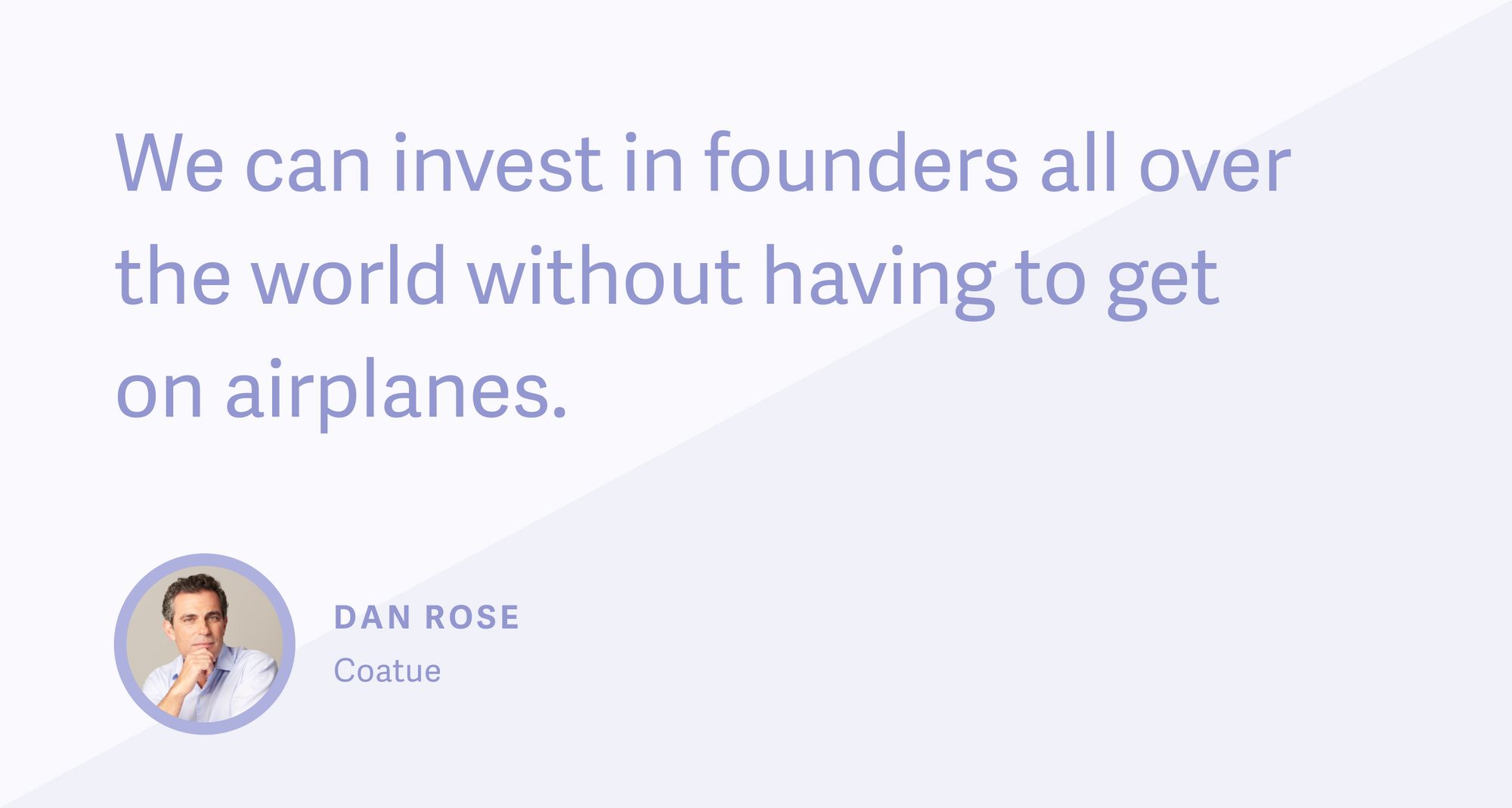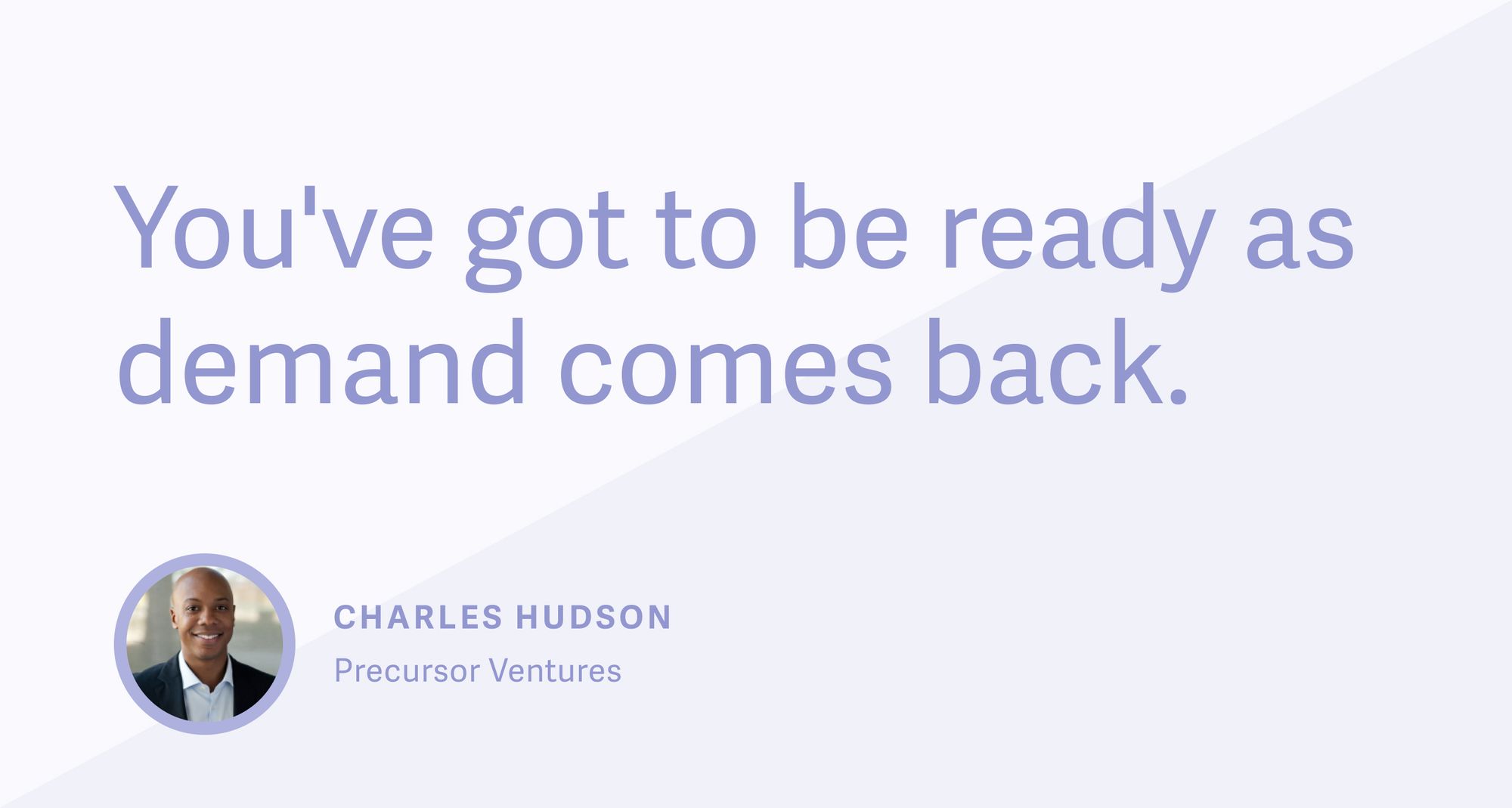
When I wrote about how to run your startup in a downturn, the world was on the brink of recession. The economy contracted sharply — and the effects of the 2020 recession will persist. Coronavirus cases in the US reached their peak since July, bringing a terrible human cost and further economic uncertainty.
If you are a founder, you can help. You can build companies that connect people, create employment, and spark lasting change.
"Building is how we reboot the American dream," declares Marc Andreessen, venture capitalist and co-founder of Andreessen Horowitz. In his rallying cry 'It's Time to Build' he writes:
"We need to break the rapidly escalating price curves for housing, education, and healthcare, to make sure that every American can realize the dream, and the only way to do that is to build."
Yet building requires capital. How do you raise funding when the economy is headed into uncharted territory? I spoke with 6 top venture capitalists to find out.
How has investment behavior changed?
- Deal velocity has gone up
- The bar for investments is rising
- VCs are nurturing existing investments and "proto-founders"
The recession did not cause activity to stall. In fact, deal velocity has gone up.
"It's almost like a superheated environment right now," says Bill Trenchard, general partner at First Round. "The speed with which partnerships can quickly meet with a company that's of interest is so much higher in the Zoom world. It's changing our thinking around velocity in the market, which was already very high."
"We've been as active as we were before," agrees Dan Rose, chairman at Coatue Ventures. "Maybe even slightly more active because I think more good companies are raising as kind of an insurance policy. When it became clear that we weren't going to be able to meet with founders in person anymore, we snapped to Zoom."
Velocity may be rising, but investors now require more data to reach conviction.
"The pricing is still the same but we see risk going up," explains Bill Trenchard. "You need to be very rigorous on your investment theses and how you're looking at companies. We've been looking for more grapple hooks and more data for things that we do invest in, so that we have more conviction when we do."
"There's been almost an immediate shift in terms of expectations from VCs," agrees Brianne Kimmel, founder of early stage venture firm Work Life. "Companies have been forced to come in with more richness and customer development, a clear path to revenue, a lot more of a strategic approach around the core mechanics of the business and more specifically the business model."

Sarah Guo, general partner at Greylock, also has high expectations for founders.
"There certainly is capital available, but it's not for everyone anymore," explains Sarah. "I do not feel that the rounds that I have been a part of very recently are in any way cheap or structured differently than previously. I would say that there's been flight to quality and more attention paid to burn."
"There's no reason not to continue to invest in things that you believe really could be durable and important," adds Sarah.
Facing multiple simultaneous challenges, it seems inevitable that the venture ecosystem must evolve.
Merci Grace, a partner at Lightspeed, agrees: "I'm spending a lot more time with people who are evaluating ideas and finding co-founders — I'm calling them proto-founders."
"A lot of exceptional people have read the market and realized the end of one bull market is the start of another one," remarks Merci. "This is an incredible time to start a company. New work and consumer behavior is emerging. There's a lot of creative problem-solving ahead in our industry."
How has sector focus changed during COVID?
- Some VCs are sticking with pre-pandemic themes
- Remote tooling is a major area of interest
- VCs are excited by innovations directly addressing the pandemic
Founders don't need to pivot to raise funding. Many VCs are staying true to their original investment theses.
"I'm trying to resist the urge to over-index on the current moment," says Charles Hudson of Precursor Ventures. "I know there are a lot of my friends in the venture business who earlier this year said 'we're only doing things that are remote oriented.' But I also think: at some point people are going to go back to work in some way, shape or form."
Dan Rose of Coatue has also remained on theme during the pandemic.
"At a macro level it hasn't really changed our structure around enterprise, consumer and FinTech because we still think those are the big trends, the ones that we're excited to invest in," explains Dan. "I think that the virus has actually accelerated a lot of a lot of trends in all three of those categories."
Other VCs are leaning into change — especially where products address needs that have been brought about, or accelerated, by the pandemic.
"It's changed my investment focus quite a bit," admits Sarah Guo of Greylock. "There's going to be dramatic damage that we continue to suffer in the economy and in terms of human costs, but there's also massive behaviour change and organizational change. And that opens up daylight for a lot of new solutions."
"How should people work in a remote world in terms of tooling?" asks Sarah. "How should companies communicate in a remote world? And how do people communicate with their customers? I think the focus on figuring out digital as a stronger part of everything is going to be increased."

Even before the pandemic, productivity and collaboration was an area of focus for Merci Grace of Lightspeed. At the beginning of 2020, Merci's market map identified eight categories: messaging, voice and video, calendar and meetings, documentation, project management, design, search and context, and low code/no code and internal tools.
"I think we may have been on the cusp of re-bundling productivity tools by 2021 if the pandemic hadn't taken place, but now I think that these 8 categories won't collapse into each other for much longer," explains Merci Grace.
"One of the most nascent categories, internal tools and low code/no code, is quickly becoming a must-have as companies focus on reskilling and upskilling their existing workforces."
Are VCs backing different kinds of founder?
- Founder character matters more than ever
- Founder ability to recruit and lead matters more than ever
- Expect more founders to be oriented around design and community
"Who founders are as people and how they carry themselves in the world matters more now than it ever did," advises Merci Grace of Lightspeed. "And that trend will just continue. There's no longer a separation between your personal life and your business."
"The culture of accountability we're experiencing now will continue, and bad actors will have to be accountable for their actions inside and outside of work."
"These sort of moments actually breed a very unique type of founder," observes Brianne Kimmel of Work Life. "The companies that have historically performed well in recession actually start with a very strong opinion on design and a very strong point of view on community."
"It's more about connecting with users and really having an informed opinion on where the sector is about to go — rather than leaning too heavily on shipping an MVP quickly."
Career-change founders might also find opportunities to build during the recession, according to Brianne. "I think that we'll see a new type of entrepreneur: someone who has grown up in a different sector with different expertise, and is able to move laterally into a new industry and build a new type of company."
Are valuations shifting?
- VCs disagree on whether valuations are changing
- Founders are becoming more intentional on pricing and partnership
- Non-pandemic factors may have the strongest impact on valuations

When it comes to valuations, the jury's out: VCs are observing different trends.
Bill Trenchard of First Round, who invests at the seed and series A stage, notes that valuations have not changed despite increased risk. "What I'm shocked about is that prices haven't changed and that deals are actually going faster," says Bill.
Sarah Guo of Greylock, who also invests at the seed and series A stage, agrees. "My view is valuations, for the set of things that we want to be looking at, are actually not going to adjust very much. But fewer things are going to get funded."
Charles Hudson of Precursor, who invests at the pre-seed stage, has noticed that valuations are down. "I'm even seeing valuation pullback from the group that I thought would be most immune to it, the repeat founder."
To Dan Rose of Coatue, founders are now less interested in maximizing price and more focused on picking the right price and the right partner. They are now asking: "What's the right price for me at this round in this stage of my company? And how do I make sure that I'm bringing in the right partners to help me grow to the next level?"
Brianne Kimmel of Work Life notes that valuation depends highly on the business. "I have not yet seen a cooling from a valuation standpoint if you are a repeat founder or have already curated a very senior team," says Brianne.
"It depends on first-time founder versus repeat founder, it depends on pre-product or post-product," elaborates Brianne. "I think it also depends on distribution advantages. Have you come from a related company where you're building something in a similar space, where you deeply understand the buyer already? Are there any advantages that actually set you apart? It really depends, and that influences the valuation."
How should founders prepare for tough times?
- The effects of the recession will be long-lasting
- Founders must lead with compassion
- Challenging circumstances reveal a company's true team
- Growth must be planned carefully
It is very difficult to predict the shape and duration of this recession's effects.
"How quickly we can recover is tied to the pace of scientific discovery as well the action or inaction of the federal government," says Merci Grace of Lightspeed.
"It's also a time of both feast and famine, depending on the vulnerability of businesses to the specific public health measures that prevent the spread of COVID-19."
But the message for founders is clear: prepare for the long haul.
"I expect things to be slow and sluggish through 2021," warns Charles Hudson, founder at Precursor.
Charles continues: "There are two big questions. One, how well-organized is the policy response? We have 30 to 40 million people whose relationships to the labor market have been severed. And then we have COVID-19, which is still a very big business disruption, at least in the United States. It does not yet feel to me like we have an operating procedure that allows the economy to fully get back to steam."
First Round's Bill Trenchard also foresees long-term economic pain.
"I would guess towards a 2-year slowdown until we really come out of this," says Bill.
It is not enough for startups to be well prepared. According to Dan Rose of Coatue, inspiring leadership is also essential: "The ability to stand up in front of your company and articulate a vision for why what you're doing is going to survive and thrive, regardless of what happens in the market."
This turbulent period also represents an opportunity for founders to identify those who truly believe in the overall vision.
"The opportunity in these situations is to really look around the table at the people that you have on your team," says Coatue's Dan Rose. "These moments separate the folks that are really in this for the right reasons, and have conviction in what you're doing over the long term, versus the people who may be there because they saw a short-term opportunity."
For companies finding ways to grow, the message is to grow in a controlled way.
"Be cautious that some of your growth might be turbocharged by the current environment," warns Charles Hudson of Precursor. "Don't over-hire thinking that the current situation is the new normal for your business forever. But don't be afraid to be aggressive in going out and signing up customers and putting the pedal on the gas."
Merci Grace of Lightspeed agrees that founders should balance their aspirations to grow with careful preparation for challenges ahead.
"You should both lean into that growth and do it with fewer resources and lighter fixed costs than you would have a few years ago," counsels Merci.
What's the best strategy for fundraising right now?
- Founders from top tech companies remain attractive to VCs
- Show great revenue, churn, and unit economics
- If raising pre-seed, ensure you can close the round
According to Bill Trenchard of First Round, high performers who started products at top-tier tech companies remain attractive to VCs.
"They've got great product skills, they've got great engineering skills, they've got really great insights and they've seen something scale from early stage," reflects Bill.
However, founders now need to go beyond revenue, and show great churn and unit economics.
"Most founders are focused on finding product market fit and on traction, metrics, usually revenue growth. I'd add to that churn numbers, as well as unit economics," Bill explains. "I think that people don't focus on the quality of the revenue very early on in the business. Being able to show really solid unit economics is way more important today."
Founders raising pre-seed need to be sure they can close the round.
"We've made one big change at Precursor," reveals Charles Hudson. "I used to be open to doing our 250K to 300K check up front and just saying, 'Hey, take our money, get going, we'll find the rest of it later.' Now we're much more focused on making sure that there's a minimum amount of money around the table before we wire."

For Brianne Kimmel of Work Life, the traditional pre-seed is also on hold.
"Raising too little in this environment is really quite dangerous," cautions Brianne. "The companies that I'm seeing struggling today are ones that raised from a pre-seed fund. They didn't raise enough capital, they raised at a very low valuation, or they raised in a manner in which you're almost consistently fundraising."
"It distracts you from building product and spending your time on actually hiring great people," elaborates Brianne. "And it forces you to be in this constant panic mode, where you're always trying to figure out to what extent can you layer in more capital?"
"Startups that I'm seeing that are fairly recession-proof, or ones that are less anxious in this moment in time, have raised very solid seed rounds: less concerned on valuation, but more concerned with getting enough cash in the bank to be heads down and to focus for the next 18 to 24 months."
How should founders pitch VCs over Zoom?
- Shifting to Zoom has advantages
- Developing a rapport over Zoom demands more effort
- Zoom enables global fundraising
- References are more important than ever
VCs and founders have shifted almost all their communication to video.
"I basically just lived on Zoom with a team that I was thinking about making an investment in," says Sarah Guo of Greylock. "I probably wouldn't have spent the entire four days with them if it wasn't for video. It was really interesting. You could never do that previously."
VCs and founders are also grappling with the challenges of remote communication — particularly in building great rapport.
"I try to spend time with founders that isn't transactional, even if it's just spending more time asking them about their lives and motivations, than I would have previously," says Merci Grace of Lightspeed. "You do miss a lot of useful information by not being in person, but video calls are a close second."
The opportunities that Zoom presents arguably outweigh the negatives — particularly in terms of geography.

"First and foremost, it makes it possible for us to invest in founders all over the world now without having to get on airplanes," enthuses Dan Rose of Coatue. "If you no longer have a hard requirement that you'd have to meet somebody in person before you can invest in their company, you're suddenly unlocking entrepreneurial talent from all over the world."
"It allows investors who don't live in Silicon Valley to invest in companies that they may not have been able to reach before, because now they know in the inverse direction that that requirement is dropped."
"You can meet with people more frequently, with less intense meetings, which is also a super valuable way to meet people," continues Dan. "There's less friction and you don't have to be in the same place at the same time. We've done a bunch of early stage deals in the last few months with founders who we never got to meet in person. And with companies that we're really excited about, including one in Europe that frankly, I’m not sure we would have been able to meet in person — but because we were able to do it over Zoom, it worked great."
But since VCs don't have much opportunity to meet founders in person, references matter more than ever.
Merci Grace sees personal references and customer calls as a useful way to make a holistic assessment of somebody: "To manufacture the serendipity you'd otherwise get by seeing how someone treats people in the service industry, for instance," says Merci.
How should companies survive a downturn?
- Conservative fundraising suggests lower ambition
- Cut back carefully so that the company remains relevant
- Founders should prepare for when customers return
Sarah Guo of Greylock would advise founders not to be too conservative when fundraising.
"Sometimes the reaction to that position of lower confidence is 'we should not ask for too much money, so we don't get told no'," observes Sarah. "You aren't your most ambitious self because of the environment. I think that's a mistake: the very best investors are still thinking in a very long-term mode."

When cutting costs, founders should ensure that the company will still be relevant long after the recession.
"You have to ask yourself: in 18 months are we going to be ready for our customers when they come back?" says Charles Hudson of Precursor. "And that can be building out product features that you know that you're going to need, shoring up internal processes, making sure that you're close enough to your market and your competitors and your customers."
"Don't cut or tweak the business so much that you don't have something interesting coming out of the recession," urges Charles. "You've got to be ready as demand comes back."
Founders face a huge number of challenges during this period of economic uncertainty. But the combination of high deal velocity and the shift to Zoom is creating an unprecedented opportunity to raise.
For founders and VCs alike, 2020 has changed the game for good.




